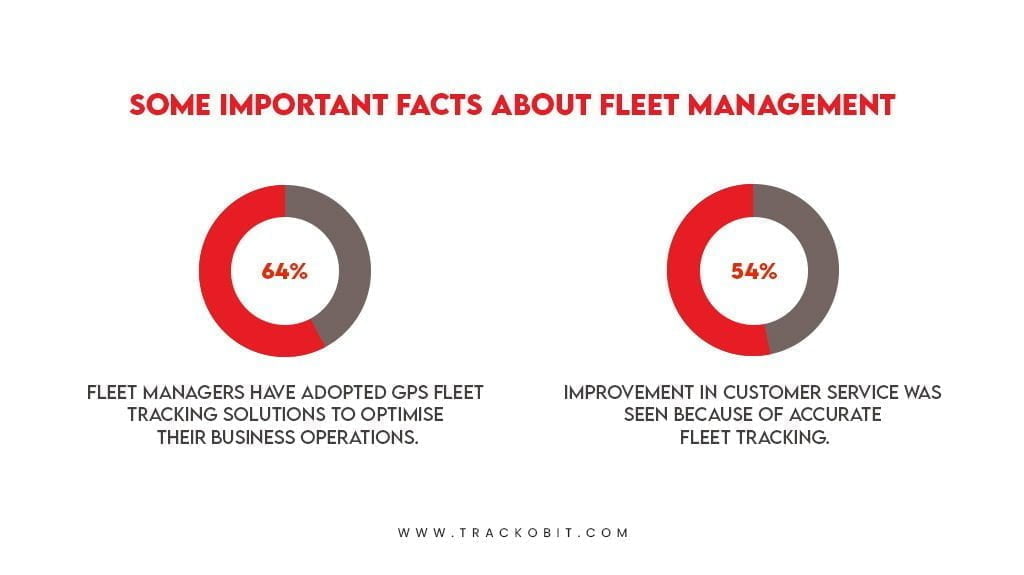-
TrackoBit
Manage commercial vehicles with the new-age Fleet Management Software
TrackoBit -
TrackoField
Streamline your scattered workforce with Field Force Management Software
TrackoField -
Features Resources
-
Blog
Carefully curated articles to update you on industrial trends. -
White Paper
Insightful papers and analysis on essential subject matters. -
Glossary
Explore an alphabetical list of relevant industry terms. -
What’s New
Get TrackoBit & TrackoField monthly updates here. -
Case Study
Explore the cases we solved with our diverse solutions. -
Comparisons
Compare platforms, features, and pricing to find your best fit.
-
About Us
Get to know TrackoBit: our team, ethos, values, and vision. -
Careers
Join the most dynamic cult of coders, creatives and changemakers. -
Tech Support
Learn about our technical support team and services in detail. -
Events
Check out the exhibitions where we left our marks and conquered. -
Contact Us
Connect with us and let us know how we can be of service.
Why Is Fleet Management Important for Businesses?
- Author:Ayushi Nagalia
- Read Time:8 min
- Published:
- Last Update: December 17, 2025
Table of Contents
Toggle
Unravelling the importance of data-driven fleet management in this time and age of technology. Learn why is fleet management important to stay ahead of the curve.
Table of Contents
Toggle
Imagine assigning one teacher to a class of 100 students. A recipe for disaster isn’t it? Well, that is exactly what happens when a large fleet is under the supervision of a manager with no proper instructions on how to plan and manage their vehicles.
But how can businesses ensure that their fleet businesses do not fall prey to such inefficient management structures?
By creating their own fleet management policy!
Fleet management is the need of the hour. It helps managers not only keep track of their vehicles but also helps them ensure efficiency. This blog will explore how fleet management can benefit fleet businesses and its various use cases.
What is Fleet Management?
Fleet businesses have a hierarchy of people that help maintain their operations. There are drivers, who are the employees in charge of executing all the tasks. Then there are managers who have to delegate the tasks and make sure that the tasks are executed properly. Finally, the authority for making decisions for the fleet belongs to the owners of the business.
Managers have the responsibility to streamline the communication between drivers and owners. But this can be difficult in the absence of a proper fleet management strategy.
In simple words, fleet management is the process that allows businesses to incorporate better coordination with their operations. This can be in the form of easier supervision or via accurate communication.
Know More About Importance of Fleet Management
Why is Fleet Management Important?
Management is the only way for any institute to maintain order in its operations. Similarly, for fleet businesses to ensure that their operations continue without any discrepancies, there needs to be a model of management. This can be in the form of a series of processes, all focussing on separate operations of the fleet business. Some of the essential things managers need to streamline to maintain their brand’s reputation are:
- Ensuring that drivers have the right training to execute tasks safely
- Maintain the vehicle’s health via regular servicing
- Track drivers to eliminate any kind of time theft during working hours
- Assigning tasks after proper planning to eliminate chaos
- Ensuring vehicle safety by constantly communicating with the driver
While on paper all these operations sound effective yet loopholes are easy to find and exploit. Data collection can make it easy to spot these loopholes in operations. Thus, helping managers realise if their fleet is facing an issue and allowing them to eradicate them.
Read Blog – Benefits of Fleet Management and It’s Features
Benefits of Fleet Management
We established that fleet management is essential. It can help fleet businesses streamline their operations and pinpoint what issues might be sabotaging their productivity or profits. But those are just some of the benefits that businesses can reap from strategic fleet management.
Let us look at some of the other benefits:
- Decluttered operations: When managers are better aware of their fleet operations, they can designate tasks and track their status effectively. Thus the chances of bad customer service due to incorrect fleet operations reduce, helping the brand build its name.
- Data sorting: With better management tools in place, managers have the opportunity to understand their fleet functions. They can collect data on their performance and study the market to see if their fleet is lacking in any way. Thus the overall quality of their business can improve a lot.
- Less Expenditure: Tracking fleets thoroughly can help managers cut down several types of expenditure. They can reduce the cost of vehicle turnover by scheduling regular vehicle maintenance for their vehicles. They can also minimize consignment/vehicle theft by making logs of their assets. Reduction in fuel pilferage can also make an impact on the fleet’s budget.
- Higher Productivity: Fleet businesses that shift to strategic fleet management for optimisation can make sure that they make better use of time. With a proper management structure and access to historical data, decision-making becomes easier and more insightful. Time thus saved can be redirected towards the management of other fleet operations.

What Businesses Need Fleet Management?
Any business dealing with several vehicles at a time can benefit from investing in fleet management. This investment can be in the form of time taken to create an effective fleet management strategy. It can also be a monetary investment to purchase fleet management software.
New Trends Expected in the Fleet Management Industry 2023
What Industries Can Benefit From Efficient Fleet Management
As we mentioned above, any industry that has to use vehicles at any stage of its operations can benefit from a custom fleet management system. It can help them tackle issues like productivity loss and lack of visibility. As they say, a stitch in time saves nine.
In the case of fleet businesses, this stitch can be in the form of data collection. Let us look into some of the industries that can transform with the help of proper fleet planning and scheduling:
- Logistics: An important part of the supply chain, logistics has the responsibility of transporting large consignments. This can be between warehouses, or from warehouse to fulfilment centres. Managers using fleet management systems have a better idea of where their business is facing trouble and can work to mitigate such challenges.
- FMCG: Perishable goods can bring forth the challenge of time sensitivity. But accurate scheduling and route planning can easily eliminate such challenges, making tasks time efficient. Fleet management can also help reduce the inventory shrink rate of businesses.
- Agriculture: It is impossible for managers to physically manage their vehicles spread over the expanse of a large field. Fleet businesses that have invested in a fleet management system do not have to struggle with this issue. The software automatically calculates the field area that wagers work on, the amount of fuel consumed, and many other metrics.
- Mining and Construction: Due to the high risk involved, the safety of vehicles takes the front seat while managing a mining fleet. This is why businesses can shift their focus to monitoring their drivers’ behaviour behind the wheel.
- Healthcare: Fleet management can help the healthcare industry tackle challenges raised by both their ambulance fleets and cold chain fleets. It can help plan efficient routes for time preservation and temperature control for the transportation of vaccines and medicines.
How Can Fleet Management Aid All Sections of the Supply Chain?
At its most basic form, the supply chain can be divided into three major steps. One thing common between all of these steps is the involvement of fleets in their operations. This is why fleet management plays an important role in the supply chain. Let us get a detailed overview of the role fleet management plays in the supply chain:
- Supplier: This step deals with the transportation of raw materials to manufacturers. For example, customers cannot consume wheat grains directly from the fields. This is why these grains are processed in the factories. The process of collecting the grains and supplying them to the factories requires large vehicles. Fleet businesses in charge need proper management to ensure no harm occurs to the perishable goods.
- Producer: Once processed in the factories, the next step is to transport these goods to the distributors. A fleet management system can help create trips that cover several suppliers in a single trip. This helps businesses save the time and resources spent on individual deliveries. This system can also ensure safety for both the products and fleet vehicles.
- Customer: The final step in this process is the last mile! This step requires managers to not only manage their vehicles but also ensure efficiency during the delivery process. A fleet management system can ensure timely deliveries and flawless dispatch management. It can help businesses manage fuel consumption, plan routes and also monitor their driver’s on-road activities.
Manage Your Fleets with TrackoBit
By now we have understood what importance fleet management holds for any fleet business. It can not only help businesses shift to data-driven operations and planning but can also help them cut unnecessary costs. While manual fleet management is also an upgrade from no management plan at all, why not shift to automation? Fleet monitoring software can take on several laborious tasks and make them error-proof.
TrackoBit is one such system that can help businesses achieve accuracy and higher visibility via a series of solutions! From route optimisation to video telematics, nothing screams efficiency more than a toolkit that is created solely to help fleet businesses out.
Try out a demo and see the wonders of this system for yourself!
Ayushi Nagalia is a Senior Content Specialist at TrackoBit. She is a marketing maverick with a lush background in literature. With years of experience crafting content for various niches, she speciali... Read More
Related Blogs
-

When Tracking Needs a Clock: Rethinking Fleet Visibility
Tithi Agarwal December 24, 2025Read on to understand why fleet tracking works better when it follows working hours. Because visibility should support operations, not…
-

What Makes TrackoBit’s Video Telematics Software Truly Next-Gen?
Shemanti Ghosh December 17, 2025TrackoBit’s video telematics software blends smart video intelligence with full server control. The result? Superior fleet reliability and safety.
-

Plug, Pair, Perform TrackoBit Introduces BLE Sensor Integration
Tithi Agarwal November 26, 2025TrackoBit’s BLE Sensor Integration enables wireless, real-time monitoring with faster installs and accurate insights. It improves fleet efficiency, visibility, and…
-

How to Use Driver Behavior Reports as a Sales Hook to Close Big Fleets
Tithi Agarwal October 16, 2025TrackoBit’s driver behavior reports empower fleet providers to win big contracts by showcasing safety, efficiency, and measurable ROI.

Subscribe for weekly tips to optimize your fleet’s potential!
Your inbox awaits a welcome email. Stay tuned for the latest blog updates & expert insights.
"While you're here, dive into some more reads or grab quick bites from our social platforms!"Stay Updated on tech, telematics and mobility. Don't miss out on the latest in the industry.
We use cookies to enhance and personalize your browsing experience. By continuing to use our website, you agree to our Privacy Policy.

































